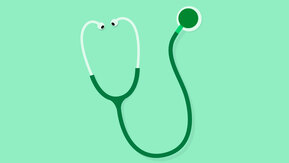In October last year, Jonny (25) had started to notice a few changes to how his right testicle felt. He checked the testicle and could feel a lump, so he decided to contact his GP about this, who arranged for him to have an ultrasound a few weeks later.
Jonny now wants to encourage other young people to be aware of changes in their bodies and to seek advice if they spot anything unusual.
Jonny’s story
Since finding my testicular lump back in early November, I have not shied away from being public about the importance of knowing what feels right for your body, and being vigilant about any changes you notice.
As a young man, I feel not many in my age group are aware of how some cancers, such as testicular cancer, predominantly affect those who are younger rather than those who are older.
There can also be a bravado among young men that they don’t feel comfortable discussing aspects of their health with their peers or even with their GP, so I am passionate about getting as much exposure on this as possible.
I’ve been open on social media about how to do a testicular examination and in explaining what you can expect if you find something that does not seem right.
"I noticed my right testicle had moved and my testis were tender."
A few days later I was getting changed for a night out with friends and I noticed my testis had gone back to its normal position in my scrotum.
When examining the testis, I felt a lump on the normally smooth surface of exterior. When I was back home, I contacted my GP and shared my symptoms. My GP got in touch to say they had scheduled an urgent ultrasound scan of my scrotum.
Two weeks later, I had my ultrasound. This was a 5 to 10 minutes painless procedure. The sonographer commented that there was a shadow on my right testis, and they would be sending a “red flag” radiology report to my GP. This was on a Friday, so I had to wait until Monday before I heard back from my GP.
The Monday came and my GP rang me to say he would be sending an urgent referral to urology. As I had access to my medical record on my phone, seeing the words “irregular and heterogenous testicular lesion highly suspicious of malignancy”, I was alarmed but not too panicked as I knew I was in the system.
“My urologist examined me and explained I had testicular cancer”
In the appointment, it was explained that surgery to remove the entire testis and spermatic chord would be the most appropriate course of action.
At this point I wanted the whole thing out of me. She explained that the surgery will take place within a few weeks. In the interim I had bloods taken to test for tumour markers and a CT scan of my chest, abdomen and pelvis. The scan was to stage if there were other tumours.
I was also sent for sperm banking bloods, as young males are offered sperm banking due to the potential effects on fertility following surgery and cancer treatment.
The next few weeks were sobering but I tried my best to stay rational. My family and close friends have been a real comfort throughout this whole journey.





